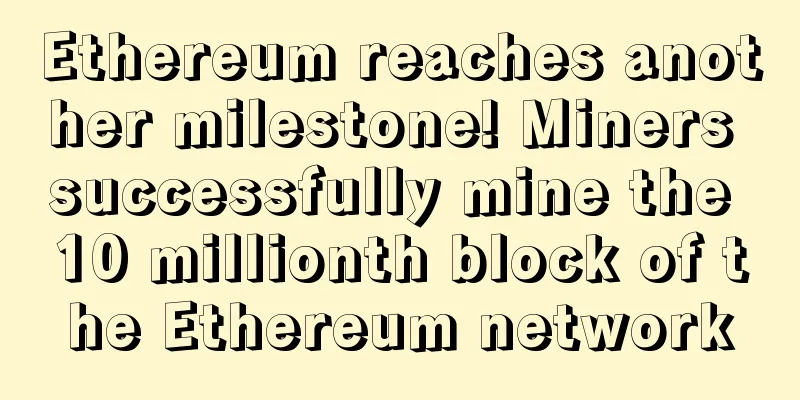Ethereum reaches another milestone! Miners successfully mine the 10 millionth block of the Ethereum network

|
Editor’s note: The original title was “Another milestone for Ethereum: 10 million blocks mined in five years”. This article has been edited without changing the original intention of the author. According to Decrypt on May 4, Ethereum miners have mined a total of 10 million blocks in just five years. Miners have mined Ethereum’s 10 millionth block, a major milestone for the second-largest cryptocurrency by market cap. Data from blockchain browser Etherscan shows that miners successfully mined the Ethereum network’s 10 millionth block at 01:22:13 PM UTC on May 4. In comparison, the Bitcoin network has only mined 628,900 blocks since its launch on January 3, 2009. However, the Bitcoin network has a much longer block time than Ethereum, with an average block time of about 10 minutes. Ethereum was launched in 2015 and was envisioned as a decentralized "world computer." Ethereum quickly rose to prominence among the top 100 cryptocurrencies by market capitalization after its launch, and saw explosive growth in market capitalization in 2017. It is currently ranked second by market capitalization. Before graphics cards took over mining, people usually used CPUs as mining machines. After that, ASIC miners dedicated to mining cryptocurrencies took over this field. These miners quickly expanded the mining game. Luit Hollander wrote in "The History of Ethereum" that it would take a CPU more than 150 million years to calculate the hash value required to mine 10 million blocks of Ethereum. Aaron Hensaw, founder of blockchain infrastructure provider Bison Trails, tweeted: Ethereum just mined its 10 millionth block! Ethereum has made incredible progress since the genesis block in 2015. There will be many exciting second-layer solutions launched this year, such as keep_project, NuCypher, and SkaleNetwork, which will help expand the scale of the Ethereum network. Ethereum's white paper originally envisioned processing a block every 12.6 seconds. In practice, however, the block time is slightly longer. According to Bitinfocharts, the average Ethereum block time is around 20 seconds, and can occasionally reach 50 seconds during periods of network congestion. However, these milestones will soon become history as Ethereum moves to a Proof-of-Stake (PoS) consensus model in the coming years. This article was translated with permission from DecryptMedia.com Link to this article: https://www.8btc.com/article/591535 |
Recommend
Institutions sold 230,000 Bitcoins in the past two months: Who is selling and why?
236,237, which is the known large institutional B...
Judging from his face whether he is a geek or a playboy
Sometimes girls are always undecided when faced w...
The relationship between mouth and personal fortune
The relationship between mouth and personal fortu...
Do people with high and straight noses have strong motivation?
The nose represents wealth, especially in middle ...
Where is the best place for women to have moles? Women with moles have good fortunes.
A woman with a mole in her hair From the perspect...
What to watch out for at the Bitcoin 2022 conference in Miami?
From April 6th to 9th, 2022, the four-day "B...
The nose can tell a lot about a happy marriage
The nose can tell a lot about a happy marriage Ph...
How to tell personality from eyes in physiognomy
A person's personality is actually related to...
Arno Laeven, head of Philips Healthcare Blockchain Lab, is leaving to seek new opportunities in blockchain
Rage Review : The founder and head of Philips Blo...
Is it good for a boy to have a high forehead? Analysis of the face of a man with a high forehead
The elderly often say that people with high foreh...
Li Guoquan: Building the next generation Internet based on credit
Rage Comment : A year ago, "blockchain"...
Experts warn that Bitcoin is an extremely risky investment
In a LendEDU survey last month, almost 80% of Ame...
Analysis | Using hash rate trends to predict Bitcoin mining cost price after halving
Author: Village Head Two Old In Bitcoin, the bloc...
Canaan Creative's internal letter on its first anniversary of listing: the company's value has returned and new chips are in mass production
Original title: "One year after Canaan's...
A wealthy face does not mean a wealthy life
A wealthy face does not mean a wealthy life We of...









